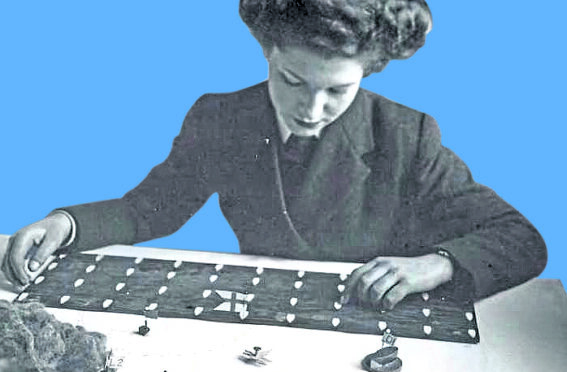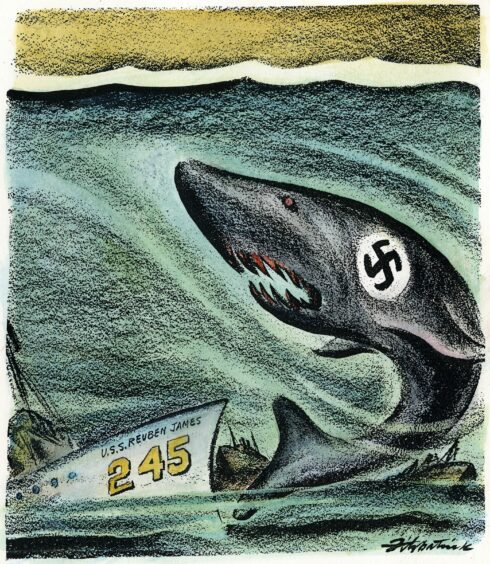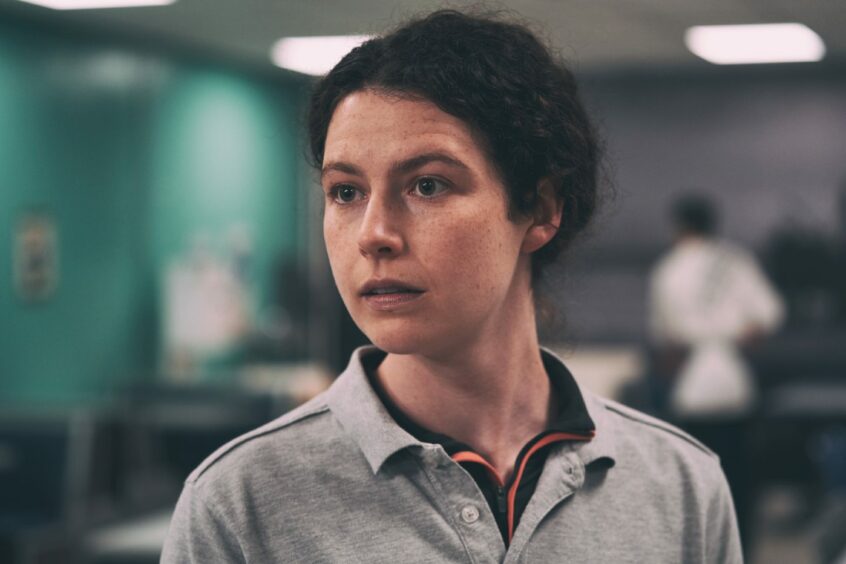
She was an unlikely war hero but Jean Laidlaw, 21 and a chartered accountant, would change the course of history and save thousands of lives in the process.
As German U-boats repeatedly targeted Britain’s merchant ships and food grew scarce in Britain, only the tactical nous of Laidlaw found a way to overcome the Nazis’ lethal underwater wolf packs.
She was the first recruit of the Western Approaches Tactical Unit (WATU), a group of highly-skilled women who helped the Allies win the war. They did what the top brass at the Admiralty could not, and came up with a set of tactics to outwit and outsmart the U-boat attacks on the merchant ships which were pushing Britain towards starvation.
The unit’s role in winning the Battle of the Atlantic was pivotal to the ultimate triumph, but the women’s efforts have been rendered little more than a footnote in the war effort as time has passed.
A new television series, U-Boat Wargamers, hopes to reverse that oversight, with rising star Molly Vevers – most recently seen in The Rig – playing the role of the formidable Laidlaw.
“She was amazing,” Vevers, from North Berwick, said. “She was very young – 21 – and was the first female chartered accountant in the UK, so for that time she was breaking the mould. I have so much respect for her and I think it’s important people know her story, and that she and the rest of the Wrens (Women’s Royal Naval Service) get the credit they deserve.”
The WATU was set up in 1942 in desperation at the assault the Nazi submarines were inflicting on the Allied campaign. Winston Churchill, who wrote in his memoirs that the only thing that kept him awake at night was the convoy losses, recruited Commander Gilbert Roberts, an expert on board game-style wargaming exercises who had been declared medically unfit due to TB, to lead the group.
When Roberts asked for mathematicians and gaming specialists, he was told there were no men to spare. This is where Vera Laughton Matthews came in. Having served with the Wrens in the First World War, she was put in charge when the unit reformed in 1939. The Royal Navy saw the role of the Wrens as typists and drivers, but Matthews had other ideas and instead recruited women with high-skill levels, such as mathematicians, and so more than 60 women made up the ranks of the WATU, with Laidlaw leading the way.
Vevers said: “I didn’t really know anything about any of it. I studied the Second World War at school and I had heard of the Wrens but I didn’t know about Jean or the rest of the women involved, so when I got the part I did lots of research on the Battle of the Atlantic and of everything that went on.
“The more I learned, the more I realised how crucial they were to defeating the U-boats and ultimately winning the war. I was gobsmacked that their story wasn’t better known. I tried to research Jean but it’s really difficult to find any information on her.
“As far as I understand, after the war she lived a very quiet life. From an actor’s point of view, it was good there wasn’t lots out there because it allowed more scope to build a character based on the facts I had and it didn’t feel restrictive, but I also wanted to pay respect to this real person. I found her interesting because she was so intelligent in a way that I am not. She has a very logical mathematical problem-solving brain and the way she was able to approach the war games and come up with the tactics blows my mind.
“There’s some interesting scenes we filmed where Jean is lecturing the naval officers in the new tactics they’ll use and they roll their eyes and sort of snub her. I remember really enjoying filming that scene, because Jean is the one with the answers and gets to rule the roost, so it was very satisfying, as I imagine it was for the real Jean, or at least I hope it was.”
Laidlaw named her plan Operation Raspberry – as in blowing a raspberry at Hitler. She determined that the Navy’s detection system wasn’t picking up the U-boats because the submarines were submerging to depths outwith its range, then letting the convoy pass over them and resurfacing behind it, away from the Navy’s escorts. She determined that by sending the escort vessels to the rear of the convoy, rather than the front, they would intercept the U-boats as they surfaced.
The tactics were deployed in May 1943 and 14 U-boats were lost compared to 13 of the Allied ships. Hitler pointed out to his grand admiral, Karl Donitz, that this was unsustainable and the U-boats were withdrawn from the Atlantic.
“Gilbert Roberts received a CBE but the women behind the scenes were never formally recognised,” Vevers said. “Jean went back to accounting and lived a very quiet life after the war with her partner and died in 2008.”
The six-part series on Sky History combines dramatic reconstructions alongside comments from historians and experts. It comes hot on the heels of The Rig for Vevers. The Amazon Prime supernatural thriller launched in January and starred Martin Compston, Iain Glen and Emily Hampshire alongside Vevers as Heather Shaw.
“It was on a scale I’ve never worked on before,” she said. “It was a great cast as well, so I was just buzzing to be there – I felt like a competition winner! I suppose it did feel like a big moment for me. I’d done a lot of theatre up until then, so I was just chuffed to be part of the main cast of something like that and to be in all the episodes, having a character arc to get my teeth into. It was really exciting.”
Vevers, who will appear in the upcoming ITV drama about serial killer Peter Sutcliffe, says she has her mum and dad to thank for getting her interested in acting.
She said: “Both of them used to do a lot of am-dram in North Berwick, so we did lots of different musicals and plays, and my mum was also a singer, doing pubs and clubs and playing in different bands. She was in an Abba tribute band for a long time and I used to go and watch her, so I got the performing bug from watching her. My parents were always really supportive and told me to go for it if that’s what I was passionate about.”
Actor: I am so full of admiration for these wargaming heroes. They only cared about the cause
The Crown and Downton Abbey star Andrew Havill says the reason the heroic work of the wargamers is so little known is because they didn’t look for glory.
Havill plays Gilbert Roberts, the commanding officer of the wargaming unit that outwitted the Nazis, in Sky’s new docu-drama about the Second World War operation.
He said. “Being in the forces was part of giving yourself up to a bigger whole in terms of having to obey orders, the chain of command, and the bigger picture. I find myself being full of admiration for people who have a sense of duty and care and a focus on the bigger thing rather than on themselves.” Havill added: “Roberts joined at 12 and was involved in the end of the First World War, but when he was invalided out due to TB, he was in the graveyard and would never be allowed back, so that seemed like the end of his career. He was recalled as a last resort due to his history of going to tactical schools when he was younger. He really grabbed this second chance.”
Havill is coming to the end of shooting on the sixth series of The Crown.
He said: “It’s incredible to be in something you feel proud of, and I feel proud to be in U-Boat Wargamers and getting to tell this story, too.”
U-Boat Wargamers, Sky History, Tuesday, 9pm

Enjoy the convenience of having The Sunday Post delivered as a digital ePaper straight to your smartphone, tablet or computer.
Subscribe for only £5.49 a month and enjoy all the benefits of the printed paper as a digital replica.
Subscribe © Granger/Shutterstock
© Granger/Shutterstock © David Reiss
© David Reiss © Amazon Prime
© Amazon Prime